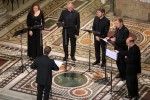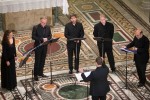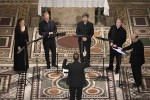Ravenna Festival

2014 - Saturday 21 June, 9 p.m. - Basilica di San Vitale
PAX DE CAELO DESCENDIT
The peace of Cateu-Cambrésis, signed near Cambrai in 1559, marked the end of a fifty-year war — almost entirely fought in Italy — between the House of Habsburg and the Kingdom of France. It also confirmed Spain’s direct control of the Italian peninsula, which had already begun in the xv and xvi centuries in the Kingdom of Naples and in the Rome of Alexander vi, the Spanish Pope Rodrigo Borgia. No wonder, then, that many Spanish composers of the Siglo de Oro spent quite a long time in Rome, either as musicians in the Pope’s chapels or in such institutions as the Confraternity of St. James, combining their exuberant and visionary style with the rigorous and restrained method of the great Palestrina.
Categorie:
Concerto
Tags artisti:
direttore del coro
Tags categorie:
musica antica, musica rinascimentale, musica sacra
Photo Gallery










